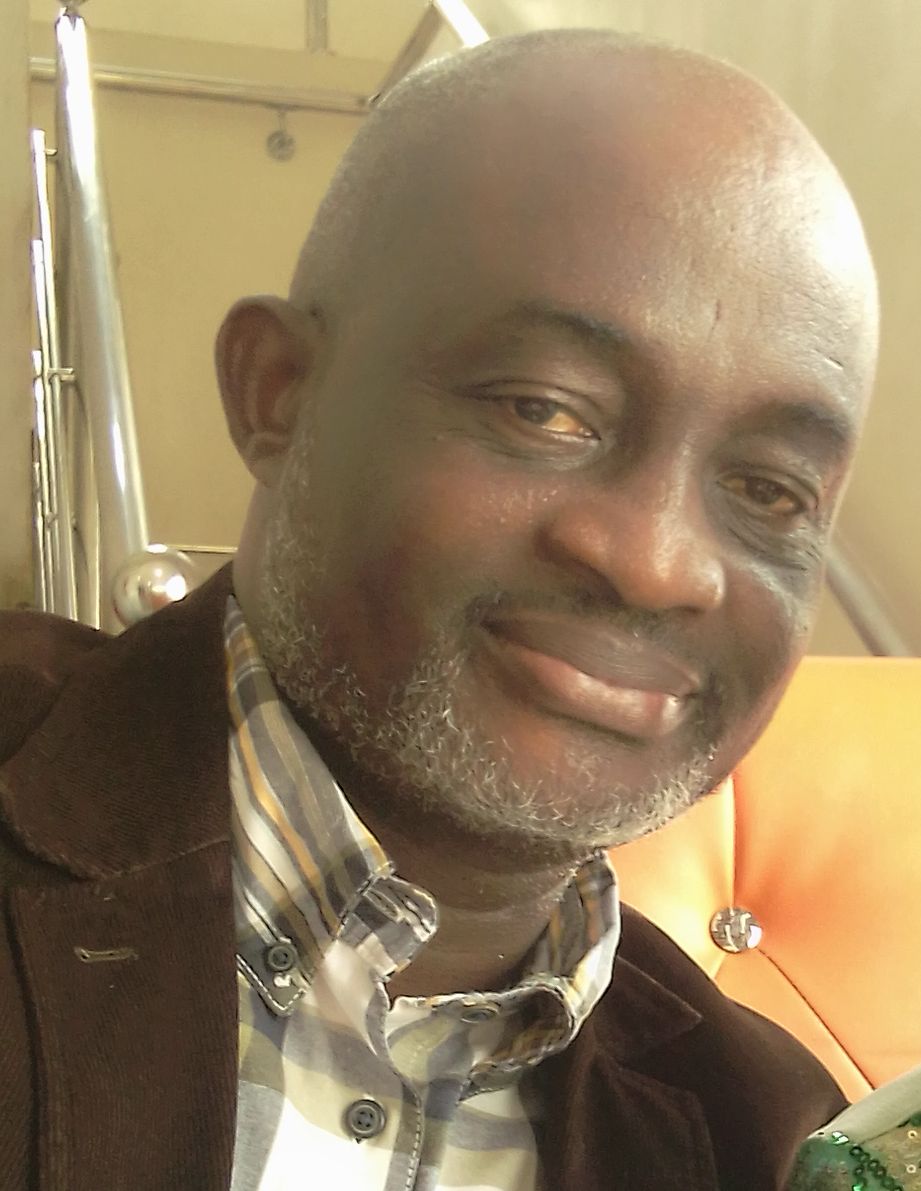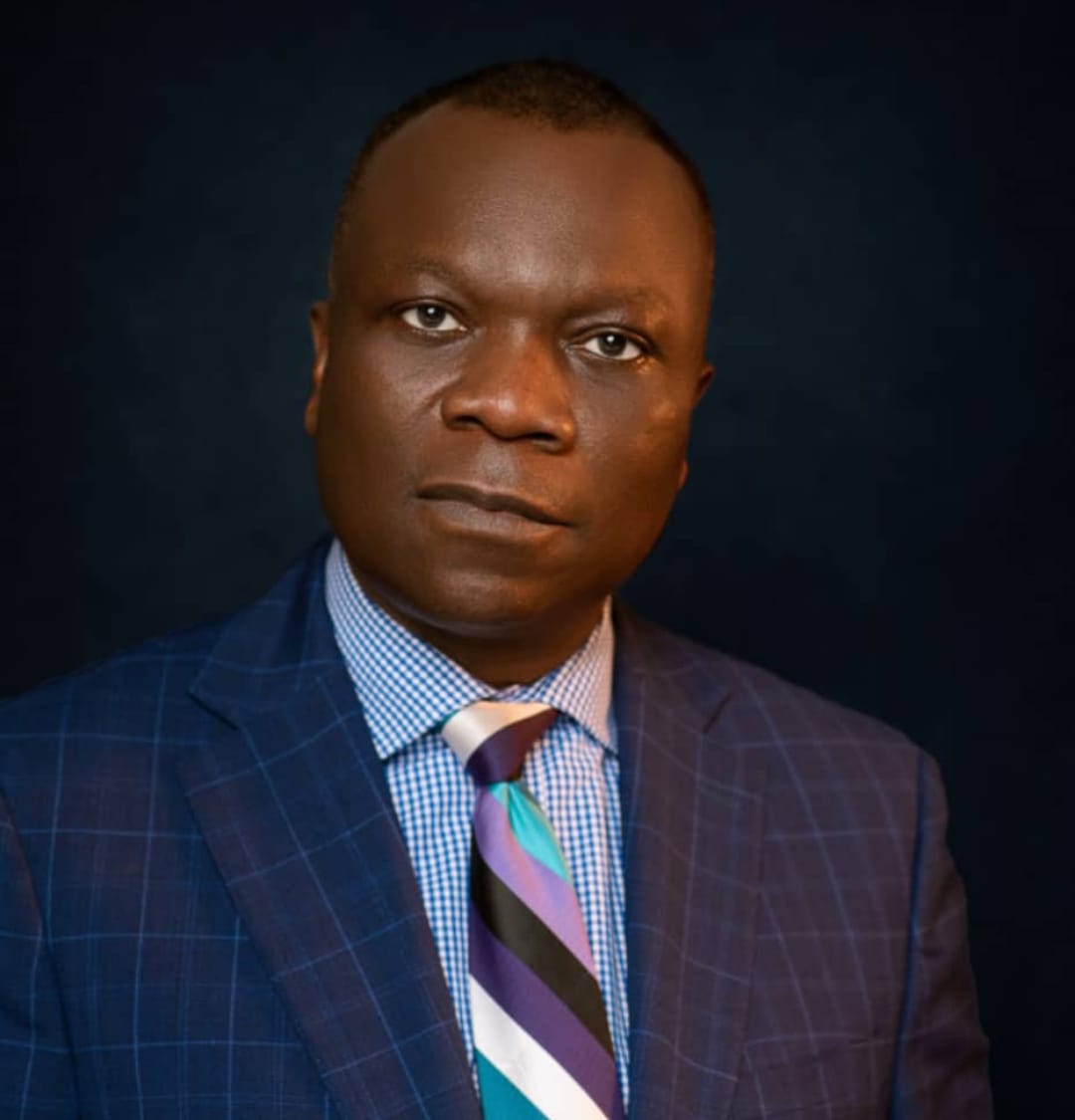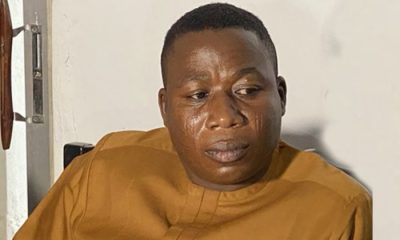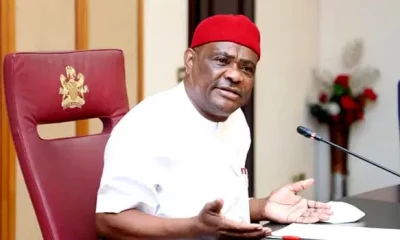celebrity radar - gossips
Surviving Nigeria’s Pan-Fulani President With Sunday Igboho By Felix Oboagwina

Surviving Nigeria’s Pan-Fulani President With Sunday Igboho
By Felix Oboagwina
After a house detention spanning two years, Nigeria’s Sunday Igboho earlier this month finally secured his freedom from Benin Republic. He did not return to Nigeria. He jetted out to Germany.
Igboho, 56, a Yoruba nation separatist and whose real name is Chief Sunday Adeyemo, ran afoul of that Francophone nation’s laws for attempting to secure its passport through the backdoor. They arrested him. Worldwide pleas by Yoruba people were made for his release, with even the Nobel Laureate, Professor Wole Soyinka, paying Igboho a visit in custody May 2022. Perhaps reluctant to court the ire of President Muhammadu Buhari, Cotonou had dilly-dallied over Igboho’s case until the Fulani-born retired-Army General’s tenure expired on May 29.
Igboho became a fugitive from Nigeria after the Department of State Services (DSS) raided his Ibadan, Oyo State home. This followed his effrontery in issuing a deadline to almighty Fulani herdsmen who for years had unleashed an orgy of kidnapping, murder and rape on rural communities in Sunday’s native Yoruba South-West. The Fulani pseudo-monarch, Seriki Fulani, served as intermediating agent for ransom payment to the kidnappers, who slew several captives and frightened farmers away from farmlands. SOS cries to security agents went unheeded. Finally, Igboho led natives on a raid of the camp of this Fulani army of occupation in Igbo-Ora, Igangan, Ibarapa and environs in Oyo State.
Reprisal came from an unexpected quarter. Clearly acting under the instructions of The Presidency and the agency’s Fulani-born CEO Yusuf Magaji Bichi, DSS operatives stormed Sunday Igboho’s home in a midnight invasion on July 1, 2021, unleashing sorrows, tears and blood in a rain of bullets. DSS slaughtered two unarmed occupants and arrested 12. The Yoruba activist himself escaped. Government froze all his bank accounts. While attempting to reach Europe through the West African country, Igboho fell into the hands of the gendarmes when he tried to arrange travel documents informally. Abuja mounted pressure for his repatriation back home. However, Buhari and his Fulani collaborators underestimated the centuries-old socio-cultural ties between Benin Republic Yoruba and Nigerian Yoruba. Those ties saved Adeyemo.
What offence did Igboho commit, except confront foreign Fulani killing Nigerians? The story began with the house-rat inviting the bush-rat to come and partake in the abundant food available at home. Perhaps because of climate change and shrinking grazing grounds in the Savannah, Fulani cowboys zeroed in on Middle-Belt and Southern Nigeria’s lush greenery. Buhari, a pan-Fulani bigot being in power, Fulani irredentism won. He threw the borders open. Unchecked, the itinerant herders arrived here in droves from all over Africa and filtered through the land. They came with their AK47s, anti-aircraft propelled rocket launchers and unleashed a new brand of terrorism. Migrant Fulani militias unleashed terror everywhere the soles of their feet marched. They still do. Videos have been seen of helicopters landing in thick forests to supply these militias with arms and provisions. This was state-backed terrorism.
Like the helplessness they displayed in Igboho’s neck of the wood in Ibarapa, security agencies made zero or half-hearted efforts to halt the Fulani militants’ evil activities nationwide. The world termed them the second deadliest terror group in the world, but pro-Fulani Buhari’s regime held back. His government sold the official false narrative that herdsmen killing unarmed rural dwellers arose from axiomatic farmers-herdsmen clashes. Such rhetoric served as white-washing PR, if not justification, for the killings, even as their body counts mounted nationwide. Buhari’s government consistently sided with the foreign aggressors.
It will not be forgotten, the ignoble role of Buhari’s spin-doctors and attack dogs: Femi Adesina, Garba Shehu and Lai Mohammed. Such names will go down in infamy as defenders of killer Fulani. Adesina once said those who failed to give up land to the Fulani should prepare to forfeit their lives –undoubtedly his pan-Fulani paymaster, Buhari’s veritable voice.
Buhari came from a Fulani father and a half Kanuri half Hausa mother. He hails from the Fulani stock in Daura, Katsina State. Also called Fulbe, the Fulani tribe originated from nomads in North Africa and sub-Saharan Africa, settling into Central and West Africa. Upon landing on Nigerian soil, and in order to secure population and numerical advantage, the Fulani heads formed a socio-political alliance with their Hausa hosts; and today, they are jointly tagged Hausa-Fulani. But when push comes to shove and competition for posts and resources becomes inevitable, Hausa and Fulani individuals resort to their separate ancient tents. Despite being less than 9 percent of Nigeria’s population, the Fulani wield much socio-political and socio-cultural superiority.
In relationship to other Nigerians, Buhari and fellow Fulani irredentists rate their foreign cousins higher. Nigerian Fulani’s affinity with cousins from Mali, Niger, Chad, Cameroun, Guinea-Bissau and Libya gives these invaders licence to infiltrate the Nigerian space.
Going by narratives from APC chieftains privy to the affair, foreign Fulani militants had been recruited to push Buhari into power in 2015. President Goodluck Jonathan saw the handwriting on the wall and quickly threw in the towel to prevent a bloodbath. The APC kingpins claimed that politicians reneged on agreements with the imported militants, which infuriated them and made them go wild. However, something else fuelled the foreigners’ daredevilry –a pan-Fulani agenda.
In his eight years, President Buhari powered that pan-Fulani agenda. The agenda drove his lopsided pro-Fulani appointments, especially in security and the entire Armed Forces. The agenda theoretically centred on rallying Fulani in Africa to migrate to Nigeria and create a monolithic nation that would subjugate other nationalities as minorities. Buhari gave the foreign Fulani traction in Nigeria. For all he cared, Nigeria’s other 370 tribes could go to hell, once the Fulani worldwide secured Nigeria as their homeland. Resultantly, Fulani foreigners flocked into Nigeria like locusts. Egged on by the likes of the then Kaduna State Governor, they unleashed a scorched earth policy on minorities in Southern Kaduna, Zamfara State, Benue State, Plateau State, Nasarawa State, Niger State and other places, and drove millions into IDP camps. Benue recently said it lost over 20,000 lives to these marauders.
The regime supported the pan-Fulani campaign with policies. It floated the rejuvenation of North-South grazing routes that his spin-doctors said farmers had encroached upon and triggered clashes. But grazing routes were a colonial era convenience that no one wanted revived; hence, the move failed to fly.
Undeterred, the government went ahead to float a malevolent Waterways Bill, which many saw as a ploy to give Fulani herdsmen unrestricted access to rivers and streams in the country. Other Nigerians collectively ensured their legislators killed what could have amounted to signing the death warrant of other sub-groups.
Buhari went on to concoct plans for “Ruga” settlements. Thousands of hectares would be reserved in each of the 36 states solely for cattle grazers. Condemned as a scheme to “fulanise” the entire country, Ruga, to its antagonists, would ultimately turn into a veritable hideout for Fulani criminals and irredentists. That idea too died suffered nationwide rejection.
Other Nigerians suspected Ruga was window-dressing Uthman-Dan-Fodio’s legendary mission to spread the Sokoto Empire throughout the Nigerian territory and “dip the Quran in the Atlantic.” Alhaji Abubakar Tafawa Balewa, Nigeria’s first Prime Minister, during the legislative council debates on March 24, 1947 openly asserted that, “If the British departed Nigeria, the Northern people would continue their interrupted conquest to the sea.” Nigeria’s history of political instability since Independence has its roots in this Fulani quest for permanent hegemony and the determination of the rest of the country to resist the Caliphate’s domination vision.
However, Buhari himself had always shown signs of a Fulani irredentist. At the onset of the Fourth Republic, he once received a stiff rebuff from now Late Oyo State’s Governor Lam Adesina over an incident. Then usually reticent Buhari had travelled all the way from Daura to lodge a protest in Ibadan because Yoruba natives killed the cows of Fulani cattle herders. Actually, the herdsmen first unleashed an orgy of raping of women, grazing on farmlands and killing of indigenes. During Buhari’s inglorious visit, the Oyo State Police Commissioner and DSS Director vilified him for the bias displayed by someone expected to play the mediatory role of an elder statesman.
Today, Fulani incursion continues to pose an existential threat to others in the Nigerian space. And the apparent apathy and compromise of the security agencies forced the likes of Retired-General Theophilus Danjuma to voice their frustration. Danjuma, a former Fulani ally, urged other tribes to expect no protection from the “colluding” Military; and he urged them to arm themselves against the invaders.
In fact, other sections have adopted protective policies. South-West governors created “Amotekun.” As constituted authorities of the South-East dilly-dallied, the separatist group IPOB created the Eastern Security Network (ESN). Ultimately, Igbo governors rallied themselves, jointly forming “Ebubeagwu” to secure their zone. Tired of waiting for Governor Godwin Obaseki to take a similar initiative, the long-suffering Esan people in Edo State unilaterally created the Atanakpa vigilante group. Benue State formed the Community Volunteer Guards.
Additionally, states in the South and Middle-Belt have followed up with anti-grazing laws, in an uncommon determination to enforce their sovereignty in the context of a Nigerian Federation. Ironically, some dominantly Fulani states, fearing the terrorism of their immigrant cousins, have enacted similar anti-grazing laws.
Clearly, Buhari’s pan-Fulani predilection kept Nigeria divided like never before. This man divided Nigeria by choice. Like Buhari, Second Republic’s President Shehu Shagari rose from the Fulani stock; but Shagari never displayed the trappings of bigotry and led Nigeria in the path of cohesion and peace.
To continue down the path of Buhari’s pan-Fulani hallucination will only devalue the Fulani themselves and make them inevitable victims. No group owns the monopoly of violence. Victims, fighting for survival, will likely resort to self-help and in time build corporate, collaborative resistance. Who does not dread the day that Nigeria’s remaining 370 tribes will be pushed to conclude that the only good Fulani is a dead Fulani? God forbid!
Buhari and his cohorts probably forgot the transient power of power. His nightmarish eight years have ended with him, even if the bitter taste lingers in the raping, kidnapping and killings that foreign Fulani continue within Nigerian forests and highways. Like Sunday Igboho, millions of Nigerians thank God for surviving their inordinately pan-Fulani President. Goodbye to divisive bigotry and ethnic chauvinism. Goodbye to rubbish.
OBOAGWINA IS AN AUTHOR, JOURNALIST AND PUBLISHER, REACHABLE VIA: [email protected]
celebrity radar - gossips
Kingdom Advancement: God Does Not Confirm Lies or Gossip — He Confirms His Word .” — Dr. Chris Okafor

Kingdom Advancement: God Does Not Confirm Lies or Gossip—He Confirms His Word
“When Doing Business with God,
People’s Opinions Do Not Count.”
— Dr. Christian Okafor
The greatest investment any Christian can make is partnering with God. According to the Generational Prophet of God and Senior Pastor of Grace Nation Global, Christopher Okafor, when a believer commits to serving and advancing God’s kingdom, no barrier, lie, gossip, or blackmail can prevail against them.
This message was delivered during the Prophetic Financial Sunday Service held on February 15, 2026, at the international headquarters of Grace Nation Worldwide in Ojodu Berger, Lagos, Nigeria.
Doing Business with God
Teaching on the theme “Kingdom Advancement” with the subtitle “Doing Business with God,” Dr. Okafor emphasized that when a believer enters into covenant partnership with God, divine backing becomes inevitable.
“God is still in the business of covenant,” he declared. “When you make a covenant with Him, He honors the terms. When you win souls into the kingdom and remain committed to His work, He rewards you with what you could never achieve by your own strength.”
The Man of God stressed that God does not confirm lies, gossip, or negative narratives—He confirms His Word. Therefore, anyone genuinely committed to kingdom business should not be distracted by public opinion.
“No matter the blackmail or falsehood circulating around you, if you are focused on God’s assignment, those attacks will only strengthen you,” he stated.
He further noted that a believer’s understanding of God’s covenant determines their experience. “Your mentality about God’s covenant becomes your reality. When you truly know the God you serve, no devil can move you.”
Biblical Examples of Kingdom Partnership
Dr. Okafor cited several biblical figures who prospered through their partnership with God:
Abel
Abel served God with sincerity and offered his very best. His sacrifice pleased God, demonstrating that when a master is honored, he responds with favor.
David
David’s heart was fully devoted to God, and in return, God’s presence and favor rested upon him throughout his life.
Hannah
Hannah made a covenant with God, promising that if He blessed her with a child, she would dedicate him to His service. After fulfilling her vow, God rewarded her abundantly, blessing her with additional children.
Peter
Peter, a professional fisherman, surrendered his boat at Jesus’ request for kingdom work. Through that act of partnership and obedience, he experienced supernatural provision and divine elevation.
Conclusion
In closing, Dr. Okafor emphasized that one’s approach to God’s covenant determines the level of success and prosperity experienced. Commitment to kingdom advancement secures divine confirmation and supernatural results.
The Prophetic Financial Sunday Service was marked by prophetic declarations, deliverance, healings, miracles, restoration, and solutions to diverse cases presented before Elohim.
celebrity radar - gossips
At 55, Omoyele Sowore Remains a Defiant Voice of Conscience

At 55, Omoyele Sowore Remains a Defiant Voice of Conscience
By George Omagbemi Sylvester | Published by SaharaWeeklyNG
“SaharaWeeklyNG Management and Staff Salute a Relentless Campaigner for Justice and Democratic Accountability.”
As activist, journalist and politician Omoyele Sowore marks his 55th birthday, the management and staff of SaharaWeeklyNG join millions of Nigerians at home and in the diaspora to celebrate a man widely regarded as one of the most persistent and fearless voices for democratic accountability in modern Nigeria.
Born on February 16, 1971, in Ondo State, Sowore rose from student activism at the University of Lagos to become one of the country’s most recognisable pro-democracy figures. His early involvement in the student movement during the military era of the 1990s placed him at the forefront of protests against dictatorship and repression, a role that would shape the course of his life and career.
He later founded Sahara Reporters in 2006, an online investigative platform that quickly gained prominence for exposing corruption, abuse of power and human rights violations. Operating initially from the United States, the outlet became a symbol of citizen journalism and digital activism, publishing stories often ignored or suppressed by mainstream media. Over the years, the platform has reported on high-level corruption cases, electoral malpractices and security failures, earning both praise and fierce criticism from political authorities.
Sowore’s activism took a dramatic turn in 2019 when he contested Nigeria’s presidential election under the African Action Congress (AAC). Although he did not win, the campaign amplified his calls for systemic reform. Months later, he launched the #RevolutionNow movement, a nationwide protest demanding an end to corruption, economic hardship and insecurity.
In August 2019, he was arrested by Nigeria’s Department of State Services (DSS) on charges of treasonable felony. His detention, which lasted several months despite court orders for his release, sparked international condemnation from human rights groups, civil society organisations and foreign observers. The case turned him into a global symbol of resistance against state repression.
Over the years, Sowore has faced multiple arrests, court trials and travel restrictions. Yet he has remained resolute, insisting that his activism is rooted in the constitutional right to freedom of expression and peaceful assembly. Supporters describe him as a principled crusader against injustice, while critics accuse him of political extremism. Regardless of the perspective, his impact on Nigeria’s political discourse is undeniable.
His life’s work echoes the enduring words of Nelson Mandela, who once said, “Freedom is not merely to cast off one’s chains, but to live in a way that respects and enhances the freedom of others.” For many of Sowore’s followers, his sacrifices represent precisely that spirit, an unyielding struggle for a more accountable and equitable society.
Similarly, the philosophy of Martin Luther King Jr. (that “injustice anywhere is a threat to justice everywhere”) resonates deeply with the trajectory of Sowore’s activism. Whether confronting police brutality, electoral irregularities or economic injustice, he has consistently framed his struggle as one for the collective dignity of Nigerians.
Nigerian Nobel laureate Wole Soyinka once observed that “the man dies in all who keep silent in the face of tyranny.” That sentiment captures the essence of Sowore’s public life. For over three decades, he has refused silence, even when it meant imprisonment, harassment and personal sacrifice.
At 55, Sowore’s journey is far from over. He remains active in political advocacy, civil rights campaigns and public commentary, continuing to challenge what he describes as systemic failures in governance and leadership. His career reflects both the promise and the peril of dissent in a fragile democracy; where the line between patriotism and confrontation is often fiercely contested.
On this milestone birthday, SaharaWeeklyNG management and staff recognise Sowore not merely as an individual, but as a symbol of the enduring struggle for transparency, justice, and democratic renewal. His story is one of conviction under pressure, a reminder that the quest for a better society often demands courage, resilience and a willingness to stand alone.
As Nigeria navigates its complex political and economic realities, figures like Sowore continue to shape the national conversation. Whether praised or criticised, his voice remains a constant in the country’s democratic journey; loud, uncompromising and impossible to ignore.
celebrity radar - gossips
Banwo Accuses Alex Otti Administration of Governance by Propaganda

Banwo Accuses Alex Otti Administration of Governance by Propaganda
Public commentator and lawyer Dr. Ope Banwo has criticised the Abia State Government under Governor Alex Otti, accusing the administration of running what he described as a “propaganda-driven government” built on exaggerated claims and selective messaging rather than measurable governance outcomes.
In a detailed commentary, Banwo argued that while Abia State has recorded some progress in specific sectors, the government’s media machinery has inflated limited achievements into what he called “statewide miracles,” creating a disconnect between online narratives and lived realities.
Banwo, who said he initially viewed Governor Otti as a symbol of hope following the 2023 elections, noted that his concerns emerged after engaging residents and professionals living in Abia to verify widely circulated claims about infrastructure, power supply, healthcare, and transportation.
Central to Banwo’s critique is the portrayal of Abia as a state with uninterrupted electricity. He acknowledged the existence of the Aba ring-fenced power arrangement involving Aba Power and Geometric Power but argued that the arrangement has been misrepresented as statewide energy independence.
According to him, extending the Aba power project to represent the entire state amounts to misinformation, especially given acknowledged outages and the limited geographical coverage of the scheme.
He further questioned claims that Abia was the first state to assume intrastate electricity regulation, stating that other states, including Lagos State, had taken similar steps earlier.
Banwo also raised concerns over viral claims suggesting that biogas facilities are already powering Abia communities, arguing that pilot projects have been prematurely presented as fully operational infrastructure.
He noted that residents he spoke with were largely unaware of any functional biogas-powered communities, stressing that government announcements should be backed by publicly available data on scale, output, and sustainability.
On healthcare, the founder of Naija Lives Matters (NLM) questioned reports that Abia offers free medical care to all citizens above 60 years of age for life, describing the claim as unverified and unsupported by legislation, budgetary provisions, or formal policy documents.
Similarly, he criticised claims suggesting that electric vehicles operate widely across the state and that all roads have been tarred, describing such assertions as exaggerated and misleading.
The self-acclaimed Mayor of Fadeyi argued that the core issue is not the absence of development but what he described as a governance style driven by social media optics rather than transparent performance metrics.
He warned that excessive reliance on viral content, influencers, and unverified claims risks eroding public trust and undermining accountability, noting that effective governance requires data, timelines, and measurable outcomes.
“A serious government does not need to exaggerate results,” Banwo said, adding that citizens require reliable services, not slogans.
He also advised the Abia government to avoid constant comparisons with states like Lagos and its governor, Babajide Sanwo-Olu, urging the administration to focus instead on publishing verifiable performance records.
Banwo challenged the Otti administration to release clear documentation supporting its claims, including power coverage maps, healthcare policy instruments, infrastructure project lists, and implementation timelines.
He concluded that while Abia State has not “collapsed,” the growing gap between online narratives and on-ground realities could become more damaging than infrastructural deficits if left unaddressed.
-

 celebrity radar - gossips6 months ago
celebrity radar - gossips6 months agoWhy Babangida’s Hilltop Home Became Nigeria’s Political “Mecca”
-

 society6 months ago
society6 months agoPower is a Loan, Not a Possession: The Sacred Duty of Planting People
-

 society5 months ago
society5 months agoReligion: Africa’s Oldest Weapon of Enslavement and the Forgotten Truth
-

 news6 months ago
news6 months agoTHE APPOINTMENT OF WASIU AYINDE BY THE FEDERAL GOVERNMENT AS AN AMBASSADOR SOUNDS EMBARRASSING












